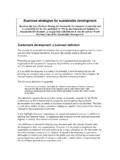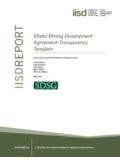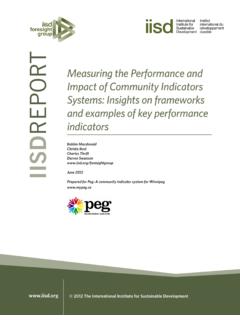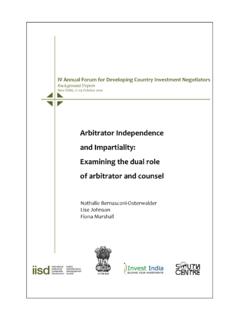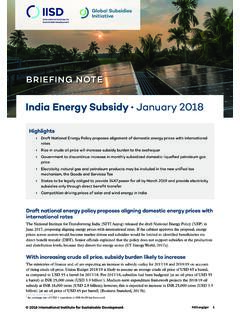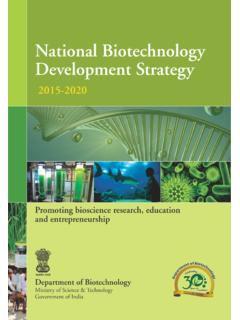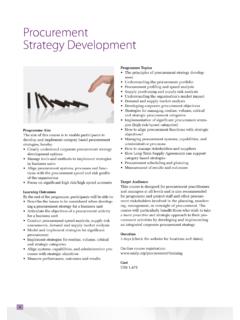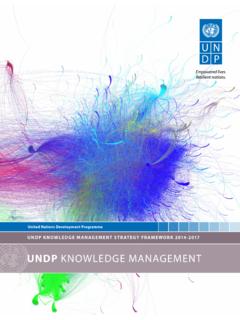Transcription of Business Strategy for Sustainable Development
1 Business strategies for Sustainable Development Based on the book Business Strategy for Sustainable Development : Leadership and Accountability for the 90s, published in 1992 by the International Institute for Sustainable Development in conjunction with Deloitte & Touche and the World Business Council for Sustainable Development . Sustainable Development : a Business definition The concept of Sustainable Development has received growing recognition, but it is a new idea for many Business executives. For most, the concept remains abstract and theoretical. Protecting an organization's capital base is a well-accepted Business principle.
2 Yet organizations do not generally recognize the possibility of extending this notion to the world's natural and human resources. If Sustainable Development is to achieve its potential, it must be integrated into the planning and measurement systems of Business enterprises. And for that to happen, the concept must be articulated in terms that are familiar to Business leaders. The following definition is suggested: For the Business enterprise, Sustainable Development means adopting Business strategies and activities that meet the needs of the enterprise and its stakeholders today while protecting, sustaining and enhancing the human and natural resources that will be needed in the future.
3 This definition captures the spirit of the concept as originally proposed by the World Commission on Environment and Development , and recognizes that economic Development must meet the needs of a Business enterprise and its stakeholders. The latter include shareholders, lenders, customers, employees, suppliers and communities who are affected by the organization's activities. It also highlights Business 's dependence on human and natural resources, in addition to physical and financial capital. It emphasizes that economic activity must not irreparably degrade or destroy these natural and human resources.
4 This definition is intended to help Business directors apply the concept of Sustainable Development to their own organizations. However, it is important to emphasize that Sustainable Development cannot be achieved by a single enterprise (or, for that matter, by the entire Business community) in isolation. Sustainable Development is a pervasive philosophy to which every participant in the global economy (including consumers and government) must subscribe, if we are to meet today's needs without compromising the ability of future generations to meet their own.
5 Implications for Business It has become a clich that environmental problems are substantial, and that economic growth contributes to them. A common response is stricter environmental regulation, which often inhibits growth. The result can be a trade-off between a healthy environment on the one hand and healthy growth on the other. As a consequence, opportunities for Business may be constrained. However, there are some forms of Development that are both environmentally and socially Sustainable . They lead not to a trade-off but to an improved environment, together with Development that does not draw down our environmental capital.
6 This is what Sustainable Development is all about - a revolutionary change in the way we approach these issues. Businesses and societies can find approaches that will move towards all three goals - environmental protection, social wellbeing and economic Development - at the same time. Sustainable Development is good Business in itself. It creates opportunities for suppliers of green consumers', developers of environmentally safer materials and processes, firms that invest in eco-efficiency, and those that engage themselves in social well-being. These enterprises will generally have a competitive advantage.
7 They will earn their local community's goodwill and see their efforts reflected in the bottom line. Practical considerations While Business traditionally seeks precision and practicality as the basis for its planning efforts, Sustainable Development is a concept that is not amenable to simple and universal definition. It is fluid, and changes over time in response to increased information and society's evolving priorities. The role of Business in contributing to Sustainable Development remains indefinite. While all Business enterprises can make a contribution towards its attainment, the ability to make a difference varies by sector and organization size.
8 Some executives consider the principal objective of Business to be making money. Others recognize a broader social role. There is no consensus among Business leaders as to the best balance between narrow self-interest and actions taken for the good of society. Companies continually face the need to trade off what they would like' to do and what they must' do in pursuit of financial survival. Businesses also face trade-offs when dealing with the transition to Sustainable practices. For example, a chemical company whose plant has excessive effluent discharges might decide to replace it with a more effective treatment facility.
9 But should the company close the existing plant during the two or three-year construction period and risk losing market share? Or should it continue to operate the polluting plant despite the cost of fines and adverse public relations? Which is the better course of action in terms of economy, social wellbeing and the environment? Moreover, many areas of Sustainable Development remain technically ambiguous, making it difficult to plan an effective course of action. For example, the forestry industry has had difficulty defining what constitutes Sustainable forest management.
10 Some critics believe that simply replacing trees is not enough, because harvesting destroys the biodiversity of the forest. Clearly, more research will be needed to resolve such technical issues. From a broader perspective, however, it is clearly in the interest of Business to operate within a healthy environment and economy. It is equally plain that, on a global basis, growing and Sustainable economies in the developing countries will provide the best opportunities for expanding markets. To some, Sustainable Development and environmental stewardship are synonymous.
